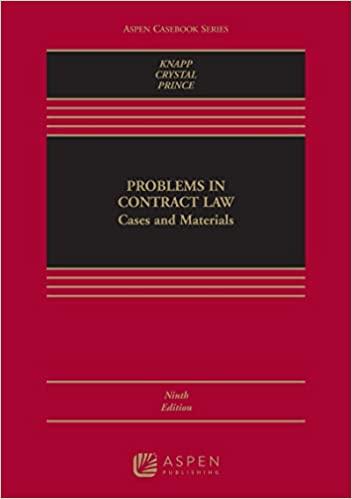Question
Eric Richards decided to go into the commercial laundry and dry-cleaning business.He began by agreeing to buy the land, building, and equipment of an existing
Eric Richards decided to go into the commercial laundry and dry-cleaning business.He began by agreeing to buy the land, building, and equipment of an existing small dry cleaner.Richards agreed to pay the owner $300,000 in cash and to assume a $150,000 existing mortgage on the property.He next entered into a contract with a local contractor to build, within 5 months, an addition to the building for $250,000.The first $40,000 was paid at the signing of the contract and the balance was to be paid in periodic installments as the construction progressed.Richards asked the contractor to post a security bond to ensure the contract would be completed in a timely manner.Richards also had some of the existing dry-cleaning equipment picked up for repair and refurbishment.When the work was completed, the repairman refused to deliver it until Richards paid in full for the work, claiming he had a lien on the equipment until he was paid. (Hint: Chapter 28).
What legal rights and obligations accompany Richards' assumption of the mortgage?
Would Richards risk losing any of his rights to recover against the surety if he granted the contractor additional time to complete the construction?
Would the person who repaired the dry-cleaning equipment be able to assert a lien until Richards paid for it and would it make a difference if the repair would had been done on site?
Is there anything Richards should have done differently to protect his assets?
Step by Step Solution
There are 3 Steps involved in it
Step: 1

Get Instant Access to Expert-Tailored Solutions
See step-by-step solutions with expert insights and AI powered tools for academic success
Step: 2

Step: 3

Ace Your Homework with AI
Get the answers you need in no time with our AI-driven, step-by-step assistance
Get Started


